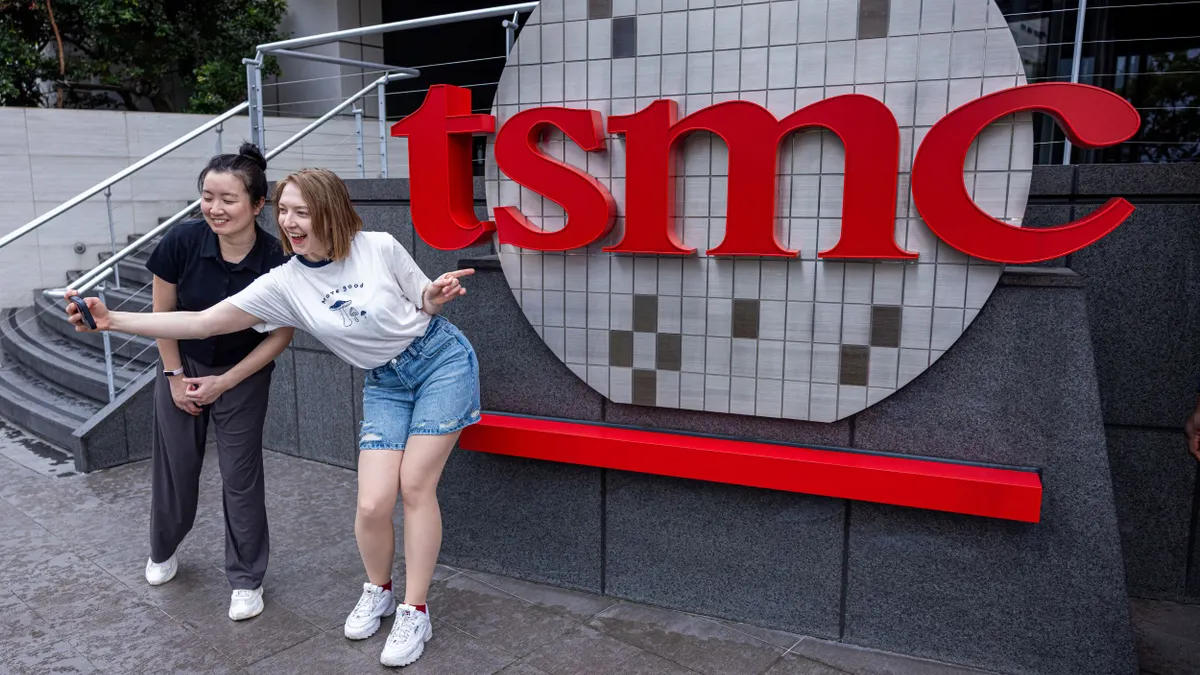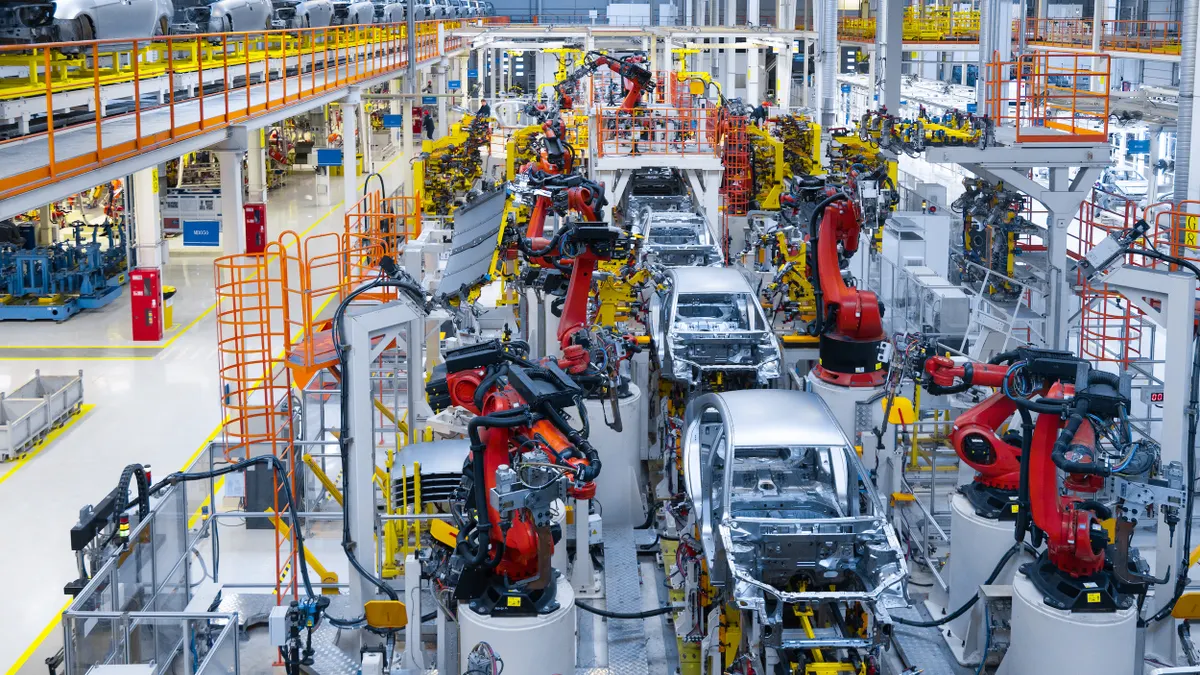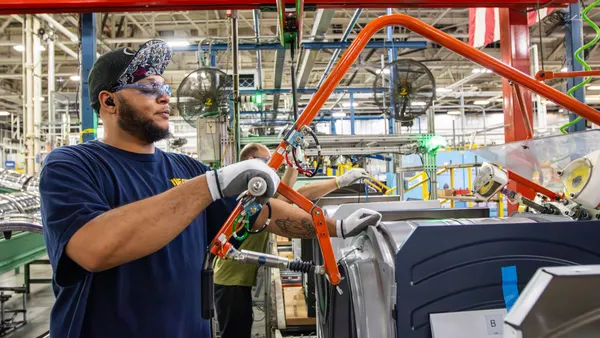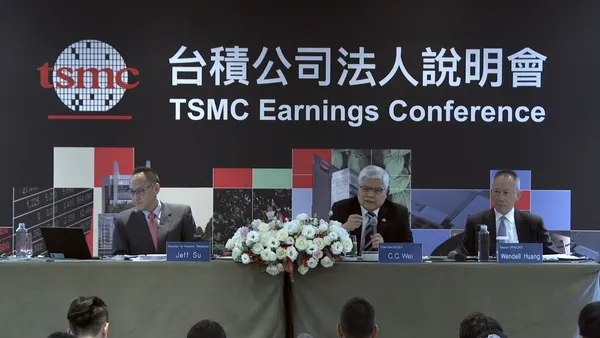Dive Brief:
- Rising artificial intelligence demand led to an increase for Taiwan Semiconductor Manufacturing Co.’s third-quarter earnings, with revenue up 40.8% year over year to an estimated $33.1 billion, the chipmaker announced Thursday.
- The Q3 revenue gains were due to the continuing strong demand for TSMC’s chip processing technologies, Wendell Huang, SVP and CFO, said in a statement.
- Looking ahead, TSMC expects revenue to be between $32.2 billion and $33.4 billion in Q4, driven by the AI demand, Huang added. The company also modified its outlook, expecting overall 2025 revenue to increase by a mid-30s percentage range, Chairman and CEO C.C. Wei said during an Oct. 16 earnings call.
Dive Insight:
The AI demand is stronger than what TSMC thought last quarter, Wei said.
“The explosive growth in token volume demonstrates the increasing consumer AI model adoption, which means more and more computation is needed, leading to more leading-edge silicon demand,” the CEO said.
The company collaborates heavily with its prominent U.S. customers, along with federal, state and local governments, Wei said. The U.S. Department of Commerce finalized the manufacturer’s $6.6 billion in CHIPS and Science Act funding last November to speed up its capacity expansion in Phoenix.
n March, TSMC announced plans to invest an additional $100 billion in the U.S., bringing its total investment to $165 billion.
The expansion includes plans for six advanced wafer manufacturing fabs in Arizona. Its fourth facility will use N2 and A16 process technology, and its fifth and sixth facilities will use “even more advanced technology,” Wei said in a July earnings call.
The company is making progress in carrying out its plan to address ongoing AI demand, Wei said. TSMC is close to securing a second piece of land near the Phoenix fabs, providing more flexibility and addressing the ongoing multiyear AI-related demand. Additionally, TSMC is preparing to accelerate upgrades to its technologies in Arizona.
“Our plan will enable TSMC to scale up through an independent gigafab cluster in Arizona to support the needs of our leading-edge customers in smartphone, AI and [high-performance computing] applications,” Wei said.
TSMC’s first fabrication facility began production on its N4 process technology in late 2024, according to the company’s website. Construction on the second fab was completed this year and volume production of its N3 wafer process technology is slated for 2028. The third fab broke ground in April that will focus on N2 and A16 process technologies.
While some of the company’s expansion projects are nearing the start of construction, TSMC is working with one outsourced semiconductor assembly and test services company that broke ground earlier this week. Amkor Technology is currently building a $7 billion semiconductor packaging and testing campus in Peoria, Arizona, which is expected to be completed in mid-2027. Production is slated to begin in early 2028.
“We are working with them because they're already breaking ground, and the schedule is earlier than TSMC's two advanced packaging fabs,” Wei said. “Our main purpose is to support our customers so we can [make] in the U.S.”
While TSMC is expanding its footprint in Arizona, the cost of overseas fabs remains higher due to the company’s scale, Huang said. Looking ahead, the chipmaker intends to focus on making its operations more cost-effective, as well as working closely with its customers and suppliers to manage the cost impact.
“At TSMC, a higher level of capital expenditures is always correlated with higher growth opportunities in the following years,” Wei added.
Despite the demand, TSMC acknowledges its customers and their clients’ concerns about uncertainties and risks from the potential impact of tariff policies, Wei said. As a result, the company will remain mindful and cautious in its business planning going into 2026.
“Amidst the uncertainties, we will also continue to focus on the fundamentals of our business — that is technology leadership, manufacturing excellence and customer trust, to further strengthen our competitive positioning,” Wei said.














